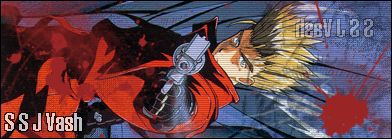What is Your Job?
21 posts •
Page 1 of 1
What is Your Job?
I want to write this, (whoops, sorry. HI EVERYBODY!!!), because I want to find out what I should do as a career. I know that I should let God decide that for me, which I'm thinking he wants me in the creative field with my friends on making RPGs and other things. But, of course, my parents want me to be a pharmacist or a dentist. (Trust me, Asian Parents want their kids to get jobs that make a lot of $$$.) I know I am/can be really creative, writing stories and all, but I feel like I have a side that is into mathematics, physics, computers, and other technical stuff. Does anyone have a clue in what I should do???
HwaRang777
-

HwaRang777 - Posts: 198
- Joined: Sat Nov 22, 2003 5:00 am
- Location: Grandville, MI, USA
-

Godly Paladin - Posts: 2016
- Joined: Sun May 23, 2004 10:21 am
- Location: Missouri
In answer to your question I owrk at hastings 
Right now I am working on a Computer information Systems degree. I then plan to get my foot into the door of the computer world. Once there I can look around and go where the money is. As long as I work with computers I'll be happy. So wherever the money is is where I'll go. I think networking sounds interesting.

Right now I am working on a Computer information Systems degree. I then plan to get my foot into the door of the computer world. Once there I can look around and go where the money is. As long as I work with computers I'll be happy. So wherever the money is is where I'll go. I think networking sounds interesting.
A nightingale in a golden cage
That's me locked inside reality's maze
Come someone make my heavy heart light
Come undone, bring me back to life
It all starts with a lullaby
That's me locked inside reality's maze
Come someone make my heavy heart light
Come undone, bring me back to life
It all starts with a lullaby
-

Kenshin17 - Posts: 860
- Joined: Tue Nov 02, 2004 9:17 am
- Location: On the earth, perhaps
If you have multiple interests, you can pick one career and keep the other as a hobby. It's hard to make a career out of any of those fields - medicine or writing or engineering, etc. They all require a lot of study and practice. Engineering and Computer Science lead to good, challenging jobs that require both your math skills and your creative skills. Once you make it through college and get a "real world" job, you can still pursue creative writing as a hobby, too. Things to think about.
[color="Red"]Please visit Love146.org[/color]
A member of the Society of Hatted Members

If your pedantic about grammar, its unlikely that you'll copy and paste this into your sig, to.
A member of the Society of Hatted Members

If your pedantic about grammar, its unlikely that you'll copy and paste this into your sig, to.
-

termyt - Posts: 4289
- Joined: Sat Jun 26, 2004 12:00 pm
- Location: oHIo
Right now I'm working as an organic chem. tutor and I want to be a pharmaceutical researcher.
[color="Red"]As a man thinks in his heart, so is he. - Proverbs 23:7[/color]
The Sundries
Robin: "If we close our eyes, we can't see anything."
Batman: "A sound observation, Robin."
The Sundries
Robin: "If we close our eyes, we can't see anything."
Batman: "A sound observation, Robin."
-

Doubleshadow - Posts: 2102
- Joined: Sat Nov 13, 2004 7:04 pm
- Location: ... What's burning?
I'm a family practise resident (18 more months to go). I used to be a database administrator and developer before I went to medical school.
"you're a doctor.... and 27 years.... so...doctor + 27 years = HATORI SOHMA" - RoyalWing, when I was 27
"Al hail the forum editting Shooby! His vibes are law!" - Osaka-chan
I could still be champ, but I'd feel bad taking it away from one of the younger guys. - George Foreman
"Al hail the forum editting Shooby! His vibes are law!" - Osaka-chan
I could still be champ, but I'd feel bad taking it away from one of the younger guys. - George Foreman
-

shooraijin - Posts: 9927
- Joined: Thu Jun 26, 2003 12:00 pm
- Location: Southern California
Well, to begin with I'd recommend taking courses as broadly as possible while you're still in highschool. This will at least give you a better idea of the nature of the field. Likewise, reading books on your subjects of interest is a good way of understanding what you like and what you don't.
Speaking as an engineer, there is a lot of room for creativity in the profession. After all, engineers are the ones who research and design the technologies that make the modern world. This requires a lot of ingineuity and a great willingness to learn (and to keep learning). It is also a field that is not restrictive- it is often cross-fertilized by other disciplines. For example, environmental engineering may require an understanding not just of engineering principles, but also of ecology, geology and politics. Much of my own research (which has mainly focussed on neural networks) draws from psychology and neurobiology. You could of course, always take a minor in subject if time permits.
Speaking as an engineer, there is a lot of room for creativity in the profession. After all, engineers are the ones who research and design the technologies that make the modern world. This requires a lot of ingineuity and a great willingness to learn (and to keep learning). It is also a field that is not restrictive- it is often cross-fertilized by other disciplines. For example, environmental engineering may require an understanding not just of engineering principles, but also of ecology, geology and politics. Much of my own research (which has mainly focussed on neural networks) draws from psychology and neurobiology. You could of course, always take a minor in subject if time permits.
The scientific method," Thomas Henry Huxley once wrote, "is nothing but the normal working of the human mind." That is to say, when the mind is working; that is to say further, when it is engaged in corrrecting its mistakes. Taking this point of view, we may conclude that science is not physics, biology, or chemistry—is not even a "subject"—but a moral imperative drawn from a larger narrative whose purpose is to give perspective, balance, and humility to learning.
Neil Postman
(The End of Education)
Anti-intellectualism has been a constant thread winding its way through our political and cultural life, nurtured by the false notion that democracy means that my ignorance is just as good as your knowledge
Isaac Aasimov
Neil Postman
(The End of Education)
Anti-intellectualism has been a constant thread winding its way through our political and cultural life, nurtured by the false notion that democracy means that my ignorance is just as good as your knowledge
Isaac Aasimov
-

Technomancer - Posts: 2379
- Joined: Fri Jun 13, 2003 11:47 am
- Location: Tralfamadore
Does anyone have a clue in what I should do???
First off, I didn't know at 16yr what I wanted to do w/ my life. Still confused sometimes. You're still in that age range where you should start thinking about it, but don't stress too much about it. My opinions changed every month. I wanted to be a doctor, then a pharmacist, dentist, then etc... etc...
WHat ever you choose should be your choice and not your parents. Well, because it's your life, not thiers. You have to life it. Personally, it's pointless to get a job if it makes you unhappy or miserable, even if it does pay a lot. So to anwser your question about what you should do.... It's not my choice, it's yours. Just keep your options open. Sometimes we find the anwsers to our questions indirectly (or out from nowhere).
"A merry heart doeth good like a medicine.." Prov 17:22
The word 'impossible' isn't in my dictionary... but I don't really have a dictionary you know? - Eikichi Onizuka.
Sorry, but I stop being a teacher at 5 o'clock. - Eikichi Onizuka.
The word 'impossible' isn't in my dictionary... but I don't really have a dictionary you know? - Eikichi Onizuka.
Sorry, but I stop being a teacher at 5 o'clock. - Eikichi Onizuka.
-

agasfas - Posts: 2341
- Joined: Sat Aug 21, 2004 7:27 pm
- Location: Austin, TX
nice name, you are korean im guessing. (by your username, im korean too) I can definately voucher. My parents are like "you MUST be a doctor! or blahblah whatever not working at some liquor store or a dry cleaner"
well, i have some weird interest in psychology, like human behavior and stuff
well, i have some weird interest in psychology, like human behavior and stuff
-

Mr. SmartyPants - Posts: 12541
- Joined: Sat Aug 21, 2004 9:00 am
Well, my job right now is working at a Christian bookstore. I'm working on becoming an author.
If you can force your heart and nerve and sinew
To serve your turn long after they are gone
And so hold on when there is nothing left in you
Except the Will which says to them: 'Hold on!' ...you'll be a Man, my son!
Rudyard Kipling
Satan, bite the dust!
"You are not who your mistakes say you are; you are not the sum of your failures!"---Rev. Billy Miller
Proverbs 18:24
To serve your turn long after they are gone
And so hold on when there is nothing left in you
Except the Will which says to them: 'Hold on!' ...you'll be a Man, my son!
Rudyard Kipling
Satan, bite the dust!

"You are not who your mistakes say you are; you are not the sum of your failures!"---Rev. Billy Miller
Proverbs 18:24
-

Ssjjvash - Posts: 1073
- Joined: Sat Aug 07, 2004 3:16 pm
- Location: I abide under the shadow of the Almighty.
i am a waiter at a retirement home
Glitch's Photostream
He wants them to learn to walk and must therefore take away His hand; and if only the will to walk is really there, He is pleased even with their stumbles.

Healing hands of God have mercy on our unclean souls
once again. Jesus Christ, Light of the World, burning
bright within our hearts forever. Freedom means love
without condition, without beginning or an end. Here's
my heart, let it be forever Yours, only You can make
every new day seem so new.
Every New Day - On Distant Shores - Five Iron Frenzy
Nail pierced hands they run with blood
A splitting brow forced by the thorns
His face is writhing with the pain yet it's comforting to me
Passion - Kutless


-

glitch1501 - Posts: 2177
- Joined: Mon Oct 20, 2003 6:50 pm
- Location: the debris section
i remember i went through about 2 years struggling with what i wanted to do...mom was pressuring for a high paying job too so i understand...and i was struggling where to go to school, in state, out-of-state, what field etc etc etc etc and then i decided to just stop worrying about it
well God finally revealed to me what he wanted me to do and that's for me to be a martial arts instructor ^^
i know it's hard but i think that you'll know when you find the job you want to do and i know it's frustrating and hard to have the patience to wait i suggest tho that you keep doing what you love...God isn't gonna drop the ball He'll show you where to go ^^ hang in there bro!
BANANA!!
well God finally revealed to me what he wanted me to do and that's for me to be a martial arts instructor ^^
i know it's hard but i think that you'll know when you find the job you want to do and i know it's frustrating and hard to have the patience to wait i suggest tho that you keep doing what you love...God isn't gonna drop the ball He'll show you where to go ^^ hang in there bro!
BANANA!!

"If not now then when? If not me then who?-anonymous
and of course now i must instill the Dancing BANANA'S!






WHY AM I CRYING IN FRENCH-Vash the Stampede
ORORORORORO!-Himura Kenshin



"It is not weak to value human life!"-Raiden, Mortal Combat II
98% of the teenage population does or has tried smoking pot. If you're one of the 2% who hasn't, copy & paste this in your signature.
*ADOPTED BY* ..yea i know scary I got a adopted ~_^
Nami
and of course now i must instill the Dancing BANANA'S!






WHY AM I CRYING IN FRENCH-Vash the Stampede
ORORORORORO!-Himura Kenshin



"It is not weak to value human life!"-Raiden, Mortal Combat II
98% of the teenage population does or has tried smoking pot. If you're one of the 2% who hasn't, copy & paste this in your signature.
*ADOPTED BY* ..yea i know scary I got a adopted ~_^
Nami
-

girlninja - Posts: 388
- Joined: Sat Dec 25, 2004 3:03 pm
- Location: On the rooftops *ninja poofing*
maintenance at my church
Defend the Bible? I would as soon defend a lion! Charles Spurgeon
I want to know how God created this world. I am not interested in this or that phenomenon, in the spectrum of this or that element. I want to know His thoughts. The rest are details. Albert Einstien
Luke 23:39-43; "And it also makes me smile to think that there is a grinning ex-con walking the streets of gold that knows more about grace than a thousand theologans. No one else would have given him a prayer, but in the end that is all he had, and in the end that is all it took." -Max Lucado
[url=myspace.com/chimera189]myspace[/url]
I want to know how God created this world. I am not interested in this or that phenomenon, in the spectrum of this or that element. I want to know His thoughts. The rest are details. Albert Einstien
Luke 23:39-43; "And it also makes me smile to think that there is a grinning ex-con walking the streets of gold that knows more about grace than a thousand theologans. No one else would have given him a prayer, but in the end that is all he had, and in the end that is all it took." -Max Lucado
[url=myspace.com/chimera189]myspace[/url]
-

chimera189 - Posts: 336
- Joined: Mon Oct 25, 2004 12:00 pm
- Location: Alvin ,Texas
I'm a graduate research assistant (aka graduate student) in food science. My job varies from hardcore research stuff (i.e. analyzing phytochemicals, processing foods and developing value-added food products, running consumer taste panels, and writing papers for publications) to lab maintenance (keeping the inventory, fixing machines when it breaks down).
It's most likely that I'll be a sensory specialist in the future, who's responsible for collecting and analyzing marketing research data from taste panels for food companies. ^__^
It's most likely that I'll be a sensory specialist in the future, who's responsible for collecting and analyzing marketing research data from taste panels for food companies. ^__^
-

Mave - Posts: 3662
- Joined: Tue Aug 12, 2003 9:00 am
I do construction... Would I recommend it as a career? No, probably not.
But it is pretty good as a part time job. And the stuff you learn is quite useful. And there's that whole WWJD thing... Jesus was a carpenter...
But it is pretty good as a part time job. And the stuff you learn is quite useful. And there's that whole WWJD thing... Jesus was a carpenter...
"Be joyful always." - 1 Thes 5:16
-

Rashiir - Posts: 961
- Joined: Mon Jun 02, 2003 1:28 pm
- Location: California/New Haven, CT
I worked construction on a jobsite last summer- I would suggest you stay as far away from jobsites as you possibly can. It was not fun, and two of the guys were living in halfway houses because they had committed crimes.
"Sons of Gondor, of Rohan, my brothers. I see in your eyes the same fear that would take the heart of me. A day may come when the courage of men fails, when we forsake our friends and break all bonds of fellowship, but it is not this day. An hour of wolves and shattered shields, when the age of men comes crashing down, but it is not this day. This day we fight! By all that you hold dear on this good Earth, I bid you, stand, Men of the West!" ~Aragorn, "Return of the King"
 <-- Insomniac Banner by Aka-chan -->
<-- Insomniac Banner by Aka-chan -->
 <-- Insomniac Banner by Aka-chan -->
<-- Insomniac Banner by Aka-chan -->-
Hurricane - Posts: 28
- Joined: Tue Aug 10, 2004 2:08 pm
- Location: Colorado
Currently I work Inventory at BestBuy unloading the trucks and putting the items on the self. I'm so used to manual labor... Done it all my life so it's hard for me to complain about any physical aspects of my job. I get really bored when they need me to cover security at Bestbuy, all I do is stand in one place watching the cameras and greet the customers when they walk in. Err...
Anyways, my job consist of constantly getting TV's down from the top shelves then loading 50+ TV's back up when the truck comes. Many that are 27" plus... some 50"... Then the dishwashers and dryers.... err.. Lifting TV's over my head all day gives me a good workout.
Before this job, I worked at a food store. Baggier to cashier to the grocery department. I was really the only guy in the grocery dept. that loaded the Frozen foods onto the shelves. I would spend 5hrs a day in those darn freezers... brr.... Also, I enjoyed the grocery department because I kepted busy, unloaded the trucks and such.
Anyways, my job consist of constantly getting TV's down from the top shelves then loading 50+ TV's back up when the truck comes. Many that are 27" plus... some 50"... Then the dishwashers and dryers.... err.. Lifting TV's over my head all day gives me a good workout.

Before this job, I worked at a food store. Baggier to cashier to the grocery department. I was really the only guy in the grocery dept. that loaded the Frozen foods onto the shelves. I would spend 5hrs a day in those darn freezers... brr.... Also, I enjoyed the grocery department because I kepted busy, unloaded the trucks and such.
"A merry heart doeth good like a medicine.." Prov 17:22
The word 'impossible' isn't in my dictionary... but I don't really have a dictionary you know? - Eikichi Onizuka.
Sorry, but I stop being a teacher at 5 o'clock. - Eikichi Onizuka.
The word 'impossible' isn't in my dictionary... but I don't really have a dictionary you know? - Eikichi Onizuka.
Sorry, but I stop being a teacher at 5 o'clock. - Eikichi Onizuka.
-

agasfas - Posts: 2341
- Joined: Sat Aug 21, 2004 7:27 pm
- Location: Austin, TX
I've done (late night) stocking & inventory at a grocery store for the first few months I was out of high school, then some machinist & welding work at Kawasaki for one summer (which turned to an odd case, some of the managers are from Japan and one gave me good references for my student exchange trip and offered to help me find a nice apartment if i didnt want to be in the dorms).
-
Sync - Posts: 558
- Joined: Sun Jan 02, 2005 7:05 pm
21 posts •
Page 1 of 1
Who is online
Users browsing this forum: No registered users and 89 guests


